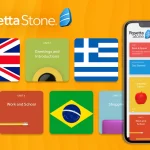Is there a big difference between Canadian and American English?
Canada and the United States are geographically“geographically” adv = regarding location and culturally close. We’ve enjoyed a long political and economic friendship. We both have English as an official language. So, is Canada basically the same as our neighbours to the south? Most Canadians will tell you we are NOT. You can find a lot of interesting political, economic, religious and cultural characteristics that make us different. Friends, but different. What about Canadian vs. American English? Are they the same? The answer is yes…and no.
If you’re like most English language learners, you probably put North American English into one category“category” noun = type of group. However, there are some variations“variations” noun = differences between English in Canada and English in the U.S. In a few cases, Canadian English has been influenced“influenced” verb = shaped, formed more by Britain than the U.S. In other cases, it’s been influenced by the French language.
Don’t worry though. The variations are minor. And once you become aware of them, you’ll be able to spot“spot” verb = find, notice the patterns immediately.
Canadian vs. American Spelling
Did you know that the spelling of some English words depends on which side of the border“border” noun = line separating countries you’re on? Here are some common ones.
‘OUR’ vs. ‘OR’ Endings
Please note that this does not include words for types of people, such as doctor and actor. Canadians always spell them with ‘or’.
‘RE’ vs. ‘ER’ Endings
Again, this doesn’t include words for types of people, like teacher, sender, farmer. These words are always spelled with ‘er’ in Canada.
Some Other Spelling Variations
Please note that you might find American spelling in some online and printed Canadian writing. Sometimes this is just an oversight“oversight” noun = small mistake. In many cases, both are equally acceptable. However, you’ll be safer maintaining the official national expectations.
Canadian vs. American Vocabulary

‘Bill’ vs. ‘Check’
When people in Canada use the noun ‘cheque’“cheque” noun  to mean the small paper document that we sign and use as a payment, we spell it c-h-e-q-u-e. However, if people in the U.S. use the word ‘check’ (same pronunciation), they spell it c-h-e-c-k. They mean a type of invoice – a list of charges that a company presents to a customer. Canadians call this a ‘bill’. So, in a restaurant, when it’s time to pay for a meal, an American would say to the server“server” noun = person who serves food, “Check, please.” In Canada, we would say, “Could I have the bill, please?”
to mean the small paper document that we sign and use as a payment, we spell it c-h-e-q-u-e. However, if people in the U.S. use the word ‘check’ (same pronunciation), they spell it c-h-e-c-k. They mean a type of invoice – a list of charges that a company presents to a customer. Canadians call this a ‘bill’. So, in a restaurant, when it’s time to pay for a meal, an American would say to the server“server” noun = person who serves food, “Check, please.” In Canada, we would say, “Could I have the bill, please?”
‘Washroom’ vs. ‘Restroom’
Canadians usually refer to public bathrooms as ‘washrooms’ and Americans often call them ‘restrooms’. However, we all understand both words, thank goodness!
‘University’ vs. ‘College’
In Canada, a ‘university’ is a place of higher learning where one earns Bachelor, Masters and Doctorate degrees. They are academic institutions. If a Canadian refers to ‘college’, he or she is talking about a community college where one can study certificate and diploma programs and be equipped for a wide range of careers. Americans often use the word ‘college’ when they are talking about any post-secondary“post-secondary” adj = after high school institute, including universities and colleges.
School Grade Levels
Canadians number our high school and university levels. In the U.S. they have specific names for each. Here’s how they compare:
Spring Break, March Break and Reading Week
In American TV shows and movies, young characters often talk about ‘Spring Break’. This brings to mind a week of parties, beaches and palm trees“palm trees” noun  . While both Americans and Canadians partake in this spring-time ritual“ritual” noun = tradition, Canadians just have a different name for it. ‘Reading Week’ is what Canadian university and college students call their February break. It doesn’t sound so exciting, does it? ‘March Break’ is what Canadian elementary and high school students call their holiday.
. While both Americans and Canadians partake in this spring-time ritual“ritual” noun = tradition, Canadians just have a different name for it. ‘Reading Week’ is what Canadian university and college students call their February break. It doesn’t sound so exciting, does it? ‘March Break’ is what Canadian elementary and high school students call their holiday.
Eh, Huh, Yeah and Uh-huh
The most famous Canadian word? ‘Eh?’ Well, it’s not really a word. It’s something we say when we are asking for agreement or confirmation. For example, we might say, “It’s cold out, eh?” the same way we would say, “It’s cold out, isn’t it?” People claim that Canadians slip“slip” verb = put ‘eh’ into every possible sentence. But that’s just a joke, eh? We don’t really say ‘eh’ that much, do we, eh?? Americans are more inclined“inclined” adj = likely to say ‘huh’, as in, “It’s cold out, huh?” in casual situations.
Similarly, when Canadians casually respond to a ‘yes or no’ question, we often say ‘yeah’ (sounds like ‘ya’) in place of ‘yes’. Americans frequently use ‘uh-huh’ as a casual yes.
Here’s an example:
Canadian vs. American Pronunciation

Vowel Sounds
The main vowel“vowel” noun = letters a, e, i, o, u sound that comes to mind is the first ‘a’ in ‘pasta’ and ‘drama’. An American would pronounce this sound almost like a soft ‘o’ or ‘aw’, as in ‘hot’. So, imagine it sounding like ‘PAW-sta’ or DRAW-ma’. Canadians, on the other hand, would say it with a soft ‘a’ sound, similar to the ‘a’ in ‘apple’. In Canada, you would hear people say ‘PA-sta’ and ‘DRA-ma’.
Another example has become a bit of a joke. I think it’s based more on legend“legend” noun = old, well-known story than reality. It’s about the way Canadians say…’about’. That’s right. Or ‘out’. ‘Pout’. ‘Stout’. Instead of saying the vowel sound the way Americans do (‘OWT’), Canadians have a reputation“reputation” noun = something other people think about you for pronouncing it more like ‘OOT’. It’s an exaggeration“exaggeration” noun = something that is only partly true, a stretched truth, of course, but maybe there is a little truth to it, depending on where you live in Canada. And to make fun of ourselves, you might hear someone say (in a strong, fake accent), “Oh, I’ve just been ‘OOT’ and ‘a-BOOT’ town today.”
Accents
Maybe this is obvious“obvious” adj = clear to everyone and it applies to every country in the world, but one’s accent and dialect“dialect” noun = local words and speech patterns really depend on where you live within a country. The U.S. is known to have many different American accents across the nation. Canadians have another set of accents. Many visitors and newcomers don’t even notice the difference. However, if you pay very close attention, compare the English spoken by a Newfoundlander with that of someone from British Columbia. Compare English from Nunavut, Quebec, rural Manitoba and downtown Toronto.
Canadian and American English are Almost the Same
After reading through the comparisons, please don’t worry! When Canadians watch American TV or read American novels, we barely notice“barely notice” verb phrase = almost do not see the variations. They are virtually“virtually” adv = basically, almost the same. The English spoken across North America has way more similarities than differences. But I think the differences serve as a nice reminder.
We might be alike“alike” adj = similar in many ways, but these little variations highlight the unique“unique” adj = special, one-of-a-kind place each country has in the world.
 Esther Penner is the creator of Open Up English. She has worked in the English language education industry for over 20 years. She has taught ESL, coordinated international student recruitment, arranged homestay accommodations and done contract writing for educational programming. Esther’s first teaching job in Japan inspired her love of travel and culture. She was born and raised in Toronto, Canada, where she lives with her husband, daughter and grumpy cat Henry.
Esther Penner is the creator of Open Up English. She has worked in the English language education industry for over 20 years. She has taught ESL, coordinated international student recruitment, arranged homestay accommodations and done contract writing for educational programming. Esther’s first teaching job in Japan inspired her love of travel and culture. She was born and raised in Toronto, Canada, where she lives with her husband, daughter and grumpy cat Henry.
Do you have any other observations about Canadian and American English language differences? Share them with us!





